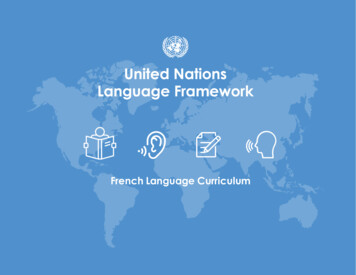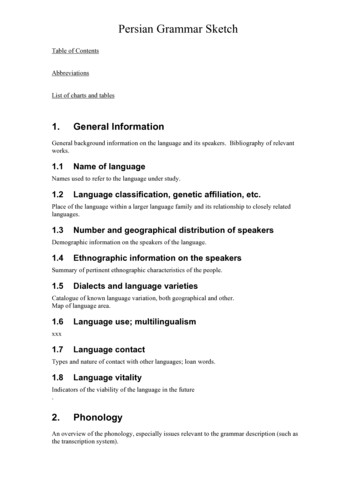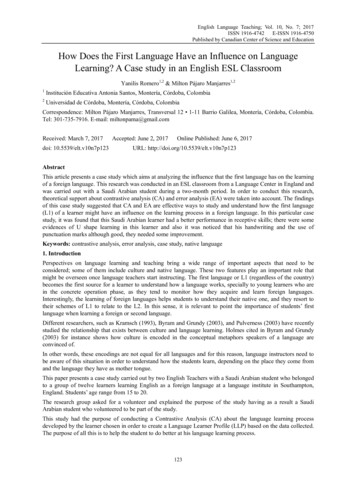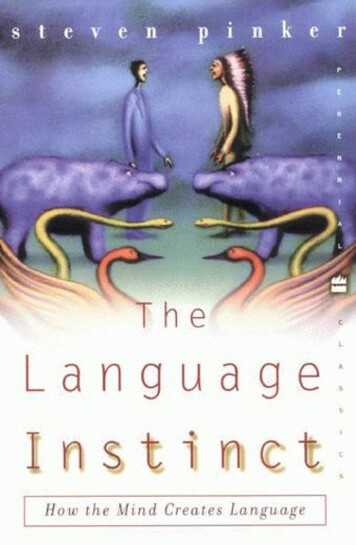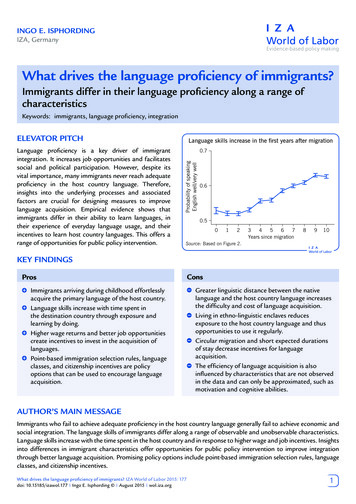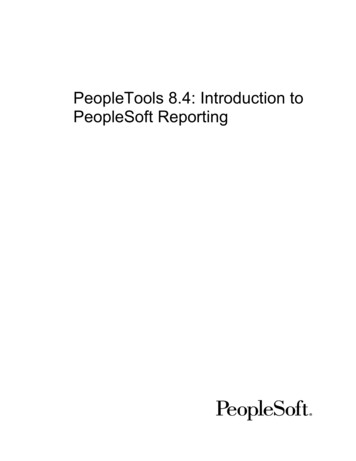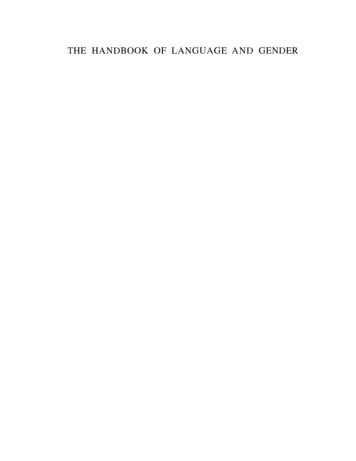
Transcription
THE HANDBOOK OF LANGUAGE AND GENDER
Blackwell Handbooks in LinguisticsThis outstanding multi-volume series covers all the major subdisciplines withinlinguistics today and, when complete, will offer a comprehensive survey oflinguistics as a whole.Already published:The Handbook of Child LanguageEdited by Paul Fletcher and Brian MacWhinneyThe Handbook of Phonological TheoryEdited by John A. GoldsmithThe Handbook of Contemporary Semantic TheoryEdited by Shalom LappinThe Handbook of SociolinguisticsEdited by Florian CoulmasThe Handbook of Phonetic SciencesEdited by William J. Hardcastle and John LaverThe Handbook of MorphologyEdited by Andrew Spencer and Arnold ZwickyThe Handbook of Japanese LinguisticsEdited by Natsuko TsujimuraThe Handbook of LinguisticsEdited by Mark Aronoff and Janie Rees-MillerThe Handbook of Contemporary Syntactic TheoryEdited by Mark Baltin and Chris CollinsThe Handbook of Discourse AnalysisEdited by Deborah Schiffrin, Deborah Tannen, and Heidi E. HamiltonThe Handbook of Language Variation and ChangeEdited by J. K. Chambers, Peter Trudgill, and Natalie Schilling-EstesThe Handbook of Historical LinguisticsEdited by Brian D. Joseph and Richard D. JandaThe Handbook of Language and GenderEdited by Janet Holmes and Miriam MeyerhoffThe Handbook of Second Language AcquisitionEdited by Catherine Doughty and Michael H. Long
The Handbook ofLanguage and GenderEDITED BYJanet Holmes and Miriam MeyerhoffBlackwellPublishing
Some images in the original version of this book are notavailable for inclusion in the eBook. 2003 by Blackwell Publishing Ltd350 Main Street, Maiden, MA 02148-5018, USA108 Cowley Road, Oxford OX4 1JF, UK550 Swanston Street, Carlton South, Melbourne, Victoria 3053, AustraliaKurfitrstendamm 57, 10707 Berlin, GermanyThe right of Janet Holmes and Miriam Meyerhoff to be identified as theAuthors of the Editorial Material in this Work has been asserted inaccordance with the UK Copyright, Designs, and Patents Act 1988.All rights reserved. No part of this publication may be reproduced,stored in a retrieval system, or transmitted, in any form or by anymeans, electronic, mechanical, photocopying, recording or otherwise,except as permitted by the UK Copyright, Designs, and Patents Act1988, without the prior permission of the publisher.First published 2003 by Blackwell Publishing LtdLibrary of Congress Cataloging-in-Publication DataThe handbook of language and gender/edited by Janet Holmes andMiriam Meyerhoff.p. cm. - (Blackwell handbooks in linguistics; 13)Includes bibliographical references and index.ISBN 0-631-22502-1 (alk. paper)1. Language and sex. I. Holmes, Janet, 1947- II. Meyerhoff,Miriam. III. Series.P120.S48 H36 2003306.44-dc212002006515A catalogue record for this title is available from the British Library.Set in 10/12pt Palatinoby Graphicraft Limited, Hong KongPrinted and bound in the United Kingdomby TJ International, Padstow, CornwallFor further information onBlackwell Publishing, visit our website;http://www.blackwellpublishing.com
For Sam
This page intentionally left blank
ContentsNotes on ContributorsAcknowledgmentsDifferent Voices, Different Views: An Introduction toCurrent Research in Language and GenderJanet Holmes and MiriamMeyerhoffPart I1History and Theoretical Background to the Studyof Language a n d GenderTheorizing Gender in Sociolinguistics and LinguisticAnthropologyBonnie McElhinnyxxvi119212 Theories of Discourse as Theories of Gender:Discourse Analysis in Language and Gender StudiesMary Bucholtz43369"What's in a Name?" Social Labeling and Gender PracticesSally McConnell-Ginet4 Variation in Language and GenderSuzanne Romaine5Language and DesireDon Kulick6"One Man in Two is a Woman": Linguistic Approachesto Gender in Literary TextsAnna Livia98119142
viiiContentsPart II7Negotiating RelationsLanguage, Gender, and Politics: Putting "Women" and"Power" in the Same SentenceRobin Lakoff1591618Gender and Family InteractionDeborah Tannen1799Gender and Power in On-line CommunicationSusan C. Herring20210 The Relevance of Ethnicity, Class, and Gender in Children'sPeer NegotiationsMarjorie Harness Goodwin22911 The Power of Gender Ideologies in DiscourseSusan U. Philips252Part III277Authenticity and Place12 Crossing Genders, Mixing Languages: The LinguisticConstruction of Transgenderism in TongaNiko Besnier27913 Claiming a Place: Gender, Knowledge, and Authorityas Emergent PropertiesMiriam Meyerhoff30214 Constructing and Managing Male Exclusivity inTalk-in-interactionJack Sidnell32715 Exceptional Speakers: Contested and ProblematizedGender IdentitiesKira Hall35316 Language and Gender in AdolescencePenelope Eckert38117 Language and Gendered ModernityWilliam L. Leap40118 A Marked Man: The Contexts of Gender and EthnicitySara Trechter423Part IV445Stereotypes a n d Norms19 Gender and Language IdeologiesDeborah Cameron44720468Gender Stereotypes: Reproduction and ChallengeMary Talbot
Contents21 Gender and Identity: Representation and Social ActionAnn Weatherall and Cindy Galloisix48722 Prestige, Cultural Models, and Other Ways of Talking AboutUnderlying Norms and GenderScott Fabius KiesUng50923 Communicating Gendered Professional Identity: Competence,Cooperation, and Conflict in the WorkplaceCaja Thimm, Sabine C. Koch, and Sabine Schey52824 Linguistic Sexism and Feminist Linguistic ActivismAnne Pauwels550Part V57125Institutional Discourse"Feminine" Workplaces: Stereotype and RealityJanet Holmes and Maria Stubbe57326 Creating Gendered Demeanors of Authority at Work andat HomeShari Kendall60027 Schooled Language: Language and Gender in EducationalSettingsJoan Swann62428 Coercing Gender: Language in Sexual Assault AdjudicationProcessesSusan Ehrlich64529 Multiple Identities: The Roles of Female Parliamentariansin the EU ParliamentRuth Wodak671Epilogue: Reflections on Language and Gender ResearchAlice F. Freed699Index722
Notes on ContributorsNiko Besnier is Professor of Anthropology at Victoria University of Wellington,New Zealand. He has published on a variety of topics in social anthropologyand linguistic anthropology, based on extensive field research in two areasof Polynesia, Tuvalu and Tonga. His current research focus is the range oftransnational experience among Tongans in Tonga and Tongans in migrantcommunities around the Pacific. He is also developing a research programmethat will focus on contemporary urban Japanese society.Mary Bucholtz is Assistant Professor of Linguistics at the University ofCalifornia, Santa Barbara. She has co-edited several books on language andgender, including Gender Articulated: Language and the Socially Constructed Self(with Kira Hall; Routledge, 1995) and Reinventing Identities: The Gendered Self inDiscourse (with Anita C. Liang and Laurel A. Sutton; Oxford University Press,1999). Her research focuses on the relationship of language, power, and socialidentity, especially race and gender. She is currently at work on a book entitledSignifying Nothing: Language, Youth, and Whiteness.Deborah Cameron is Professor of Languages at the Institute of Education,London. She has written and edited numerous contributions to language andgender studies, including Feminism and Linguistic Theory (Macmillan, 1992),The Feminist Critique of Language (Routledge, 1998), and Women in Their SpeechCommunities (with Jennifer Coates; Longman, 1988).Penelope Eckert is Professor of Linguistics, Professor by courtesy of Culturaland Social Anthropology, and Director of the Program in Feminist Studies atStanford University, California. She has published work in pure ethnographyas well as ethnographically based sociolinguistics. Her most recent books areLinguistic Variation as Social Practice (Blackwell, 2000) and Style and SociolinguisticVariation (Cambridge University Press, 2001).
Notes on ContributorsxiSusan Ehrlich is Professor in the Department of Languages, Literatures,and Linguistics at York University, Toronto, Canada. She has published in theareas of language and gender, discourse analysis, linguistic approaches toliterature, and second language acquisition in journals such as Text, The Journalof Pragmatics, Discourse & Society, and Language in Society. Her most recentbook is Representing Rape: Language and Sexual Consent (Routledge, 2001).Alice F. Freed is Professor of Linguistics and a member of the Women's Studiesfaculty at Montclair State University, New Jersey. Her research interests includediscourse analysis and sociolinguistics with a focus on issues of gender. She isthe author of The Semantics of English Aspectual Complementation (Reidel, 1979),co-editor (with Victoria Bergvall and Janet Bing) of Rethinking Language andGender Research: Theory and Practice (Longman, 1996), and author of variousarticles that have appeared in Language in Society, The Journal of Pragmatics, andothers.Cindy Gallois is Professor of Psychology at the University of Queensland,Australia. Her research centers on intergroup communication and accommodation in organizational, health, and cross-cultural contexts; she has publishedover 100 books and papers on these topics. She is a past president of theInternational Communication Association and a Fellow of the Academy of theSocial Sciences in Australia.Marjorie Harness Goodwin is Professor of Linguistic Anthropology at theUniversity of California, Los Angeles. Her work investigates how talk is used tobuild social organization within face-to-face interaction, with particular emphasis on the social worlds of young girls. Her monograph He-Said-She-Said:Talk as Social Organization among Black Children (Indiana University Press, 1990)is a study of the gendered language practices of African American children.Kira Hall received her PhD in Linguistics from the University of California,Berkeley in 1995 and is currently Assistant Professor of Anthropology andLinguistics at the University of Colorado at Boulder. Specializing in the area oflanguage, gender, and sexuality, her major publications include Gender Articulated: Language and the Socially Constructed Self (with Mary Bucholtz; Routledge,1995) and Queerly Phrased: Language, Gender, and Sexuality (with Anna Livia;Oxford University Press, 1997). She is currently writing a book on the languageand cultural practices of Hindi-speaking hijras (eunuchs) in northern India.Susan Herring received her PhD from the University of California, Berkeley in1991, and is currently Associate Professor of Information Science at IndianaUniversity. Her recent work has focused on the linguistic and social aspects ofcommunication mediated by new technologies (the Internet, the World WideWeb), especially gender patterns in these media. She has edited two books oncomputer-mediated communication and is author of 20 articles on the subject.
xii Notes on ContributorsJanet Holmes holds a personal Chair in Linguistics at Victoria University ofWellington, New Zealand, where she teaches sociolinguistics. She is Directorof the Wellington Corpus of Spoken New Zealand English and of a project onLanguage in the Workplace. Her publications include An Introrfuction to Sociolinguistics (2nd edition, Longman, 2001), Women, Men and Politeness (Longman,1995), and an edited book. Gendered Speech in Social Context (Victoria UniversityPress, 2000). She is a Fellow of the Royal Society of New Zealand.Shari Kendall is Research Associate in the Department of Linguistics atGeorgetown University, Washington, DC. She is Co-Principal Investigator withDeborah Tannen of the Sociolinguistics Work-Family Project. Her work investigates the discursive creation of identities in work and family discourse. She isco-author (with Deborah Tannen) of "Language and Gender" in The Handbookof Discourse Analysis (Academic Press, 1985) and "Gender and Language in theWorkplace" in Gender and Discourse (Sage, 1997), and (with Keller Magenau)of "'He's calling her Da Da!': A Sociolinguistic Analysis of the 'Lesbianismas Disease' Metaphor in Child Custody Cases" in the Journal of the Associationfor Research on Mothering.Scott F. Kiesling is Assistant Professor of Linguistics at the University ofPittsburgh, Pennsylvania. His dissertation work (1996) focused on language,power, and masculinity. He is currently working on language variation andchange in Australian English, with a focus on ethnicity and gender.Sabine C. Koch is a Social Psychologist and Communication Researcher. Shestudied psychology at the University of Heidelberg, Germany and Madrid,Spain, and dance/movement therapy at Hahnemann University in Philadelphia,USA. Presently she is working on her PhD in a national research project atthe University of Heidelberg, conducting verbal and nonverbal analyses ofgendered communication in work teams.Don Kulick is Professor of Anthropology at New York University. His mostrecent publications on topics of sexuality and gender include "Gay and LesbianLanguage" (Annual Review of Anthropology, 2000), "Transgender and Language"(GLQ, 1999) and the book Travesti (University of Chicago Press, 1998).Robin Tolmach Lakoff has been a Professor of Linguistics at the University ofCalifornia, Berkeley, since 1972. Among her books are: Language and Woman'sPlace (Harper & Row, 1975); Talking Power (Basic Books, 1990), and The LanguageWar (University of California Press, 2000).William L. Leap is Professor of Anthropology at American University,Washington, DC, where he teaches courses in language and culture studies,lesbian/gay studies, cultural geography, and the anthropology of education.He is the author of Word's Out: Gay Men's English (University of Minnesota,
Notes on Contributorsxiii1996), editor of Public Sex/Gay Space, and co-editor (with Ellen Lewin) of Out inthe Field (University of Illinois, 1996) and Out in Theory (University of Illinois,2002). He co-ordinates the annual Lavender Languages and Linguistics Conference and works through other channels to support the visibility of lgbtq (lesbian,gay, bisexual, transgender, and queer) scholarship (and of lgbtq scholars!) inanthropology and linguistics.Anna Livia is a visiting Assistant Professor in the French department at theUniversity of California, Berkeley. Her book on the uses of linguistic gender.Pronoun Envy, was published in 2000 by Oxford University Press. With KiraHall, she is editor of Queerly Phrased (Oxford University Press, 1997), the firstanthology to examine the interconnection of language, gender, and sexualityfrom a linguistic perspective. She is currently doing research on the collocationof gender and class.Sally McConneU-Ginet is Professor of Linguistics at Cornell University, NewYork, and active in Women's Studies (recently rechristened Feminist, Gender,and Sexuality Studies). She began publishing on language and gender topicsin 1975 and has been collaborating in this area with Penelope Eckert of StanfordUniversity since the early 1990s. She also teaches and does research in formalsemantics and pragmatics.Bonnie McElhinny is Assistant Professor of Anthropology at the Universityof Toronto, Canada. Her research focuses on language, gender, and politicaleconomy. Her publications appear in Gender and Discourse (Ruth Wodak, ed.;Sage, 1997); Sociolinguistics and Language Teaching (Sandra McKay and NancyHornberger, eds; Cambridge University Press, 1996), Dislocating Masculinity(A. Cornwall and N. Lindisfarne, eds; Routledge, 1994); Gender Articulated (KiraHall and Mary Bucholtz, eds; Routledge, 1995), and various journals. She iscurrently completing a book manuscript entitled Policing Language and Gender.Miriam Meyerhoff is Lecturer in Theoretical and Applied Linguistics at the University of Edinburgh, Scotland. Her research on language and gender focuseson the covert and overt linguistic expressions of ideologies about gender andabout the social order. She also studies syntactic change and grammaticalization.Anne Pauw els is Executive Dean of the Faculty of Arts and Professor ofLinguistics at the University of Western Australia, Perth. Her research in thearea of gender focuses on the linguistic representation of the sexes, feministlanguage planning and change, as well as gender and bilingualism/languagecontact. Women Changing Language (Longman, 1998) is her most recent book ongender and language.Susan U. Philips is Professor of Anthropology at the University of Arizona. Shereceived her PhD in Anthropology from the University of Pennsylvania. Her
xivNotes on Contributorscurrent research focuses on diversity in gender ideology in Tongan discourse.Her most recent book. Ideology in the Language of Judges (Oxford UniversityPress, 1998) addresses the discourse organization of ideological diversity inAmerican judges' courtroom language use.Suzanne Romaine has been Merton Professor of English Language in the University of Oxford since 1984. Her recent publications are Communicating Gender(Erlbaum, 1999), Language in Society: An Introduction to Sociolinguistics (OxfordUniversity Press, 2000, 2nd edn.), and (jointly with Daniel Nettle) VanishingVoices: The Extinction of the World's Languages (Oxford University Press, 2000).Sabine Schey completed a Master's (Magister) degree in linguistics at theUniversity of Heidelberg, under the supervision of Caja Thimm. While at theUniversity of Heidelberg she also worked on the WorkComm research project(communication of gender at the workplace). In this project, she was responsible for interviews and content analysis of interview data. She is now workingin the private sector doing market research.Jack Sidnell gained his PhD in Anthropology from the University of Toronto,Canada. Currently he is an Assistant Professor in the Department of Anthropology, Northwestern University and a Visiting Assistant Professor in the Department of Anthropology, University of Toronto. His research interests include talkand social organization, conversation analysis, language contact, pidgins andcreoles, and language variation and change. Current work in progress includesa book about talk, knowledge, and everyday life in a Guyanese village.Maria Stubbe is a Research Fellow in the School of Linguistics and AppliedLanguage Studies at Victoria University of Wellington, New Zealand. She hasworked on the Wellington Language in the Workplace Project since it began in1996. Her research currently focuses on the analysis of spoken discourse inworkplace communication, with a particular focus on problematic discourse andon how gender and ethnicity relate to organizational culture and communicativepractices.Joan Sw ann is a senior lecturer in the Centre for Language and Communications,Faculty of Education and Language Studies at the Open University, England.Much of her research on language and gender has been carried out in educational contexts, and she is particularly interested in the relationship betweenresearch on language and gender and educational policy and practice. Recentpublications include Introducing Sociolinguistics (Edinburgh University Press,2001; co-authored with Rajend Mesthrie, Andrea Deumert, and William Leap).Mary M. Talbot is Reader in Language and Culture at the University ofSunderland, England. Her recent publications include Fictions at Work: Language and Social Practice in Fiction (Longman, 1995), Studies in Valency 1 (editedwith Lene Sch0sler; Odense University Press, 1995), Language and Gender: An
Notes on ContributorsxvIntroduction (Polity, 1998), and All the World and Her Husband: Women in 20thCentury Consumer Culture (edited with Maggie Andrews; Cassell, 2000). Shehas also contributed to numerous journals and edited collections on aspects ofpower, gender, and language in social life.Deborah Tannen is University Professor and Professor of Linguistics atGeorgetown University, Washington, DC. Her books include Talking Voices:Repetition, Dialogue, and Imagery in Conversational Discourse (Cambridge University Press, 1989); Conversational Style: Analyzing Talk Among Friends (Ablex, 1984);Gender and Discourse (Oxford University Press, 1994); The Argument Culture(Random House, 1997); Talking from 9 to 5 (Avon, 1994); You Just Don't Understand (Morrow, 1990); and, most recently, I Only Say This Because I Love You.Though she is best known for her writing on communication between womenand men, her research interests have also included spoken and written language,cross-cultural communication, modern Greek discourse, and the relationshipbetween conversational and literary discourse.Caja Thimm is University Professor for Communication and Media Studies atthe University of Bonn, Germany. She has studied political science, communication studies, and linguistics at the universities of Heidelberg, San Francisco, andBerkeley, and published books on gendered language and dominance, andon intergenerational interaction. Her more recent work focuses on businesscommunication online/offline and electronic democracy.Sara Trechter is an Associate Professor of Linguistics in the English Department at California State University, Chico. Her work in language, gender, andethnicity focuses on the use of gender deictics in Siouan languages and theLakhota discourse construction of Whiteness.Ann Weatherall is Senior Lecturer in Psychology at Victoria University ofWellington, New Zealand. Her interest in the field of gender, language, power,and discourse was inspired by a public lecture in 1987 by Dale Spender. Herrecently completed book. Shifting Perspectives on Gender, Language and Discourse(Routledge) summarizes 15 years of research and thinking in this field.Ruth Wodak is Professor of Applied Linguistics and Discourse Analysisat the University of Vienna, Austria, and Director of the Research Center onDiscourse, Politics, and Identity at the Austrian Academy of Sciences. She hasheld visiting professorships in Stanford, Uppsala, Minnesota, and Georgetown,Washington DC. She is co-editor of Discourse & Society and Language andPolitics. Her research domains are identity, gender, political rhetoric, racism,anti-Semitism, and institutional discourse. Her most recent books includeGender and Discourse (Sage, 1997), The Discursive Construction of Identity(Edinburgh University Press, 1999), Racism at the Top (Drava, 2000), andDiscourse and Discrimination (Routledge, 2001). In 1996 she was awarded theWittgenstein Prize for Elite Researchers.
AcknowledgmentsWe would like to express our appreciation to the contributors to this volumewho responded pleasantly and in some cases even speedily to our requestsfor drafts, revisions, and final versions of their papers. We would also liketo express appreciation to the helpful and supportive volume editors withwhom we worked, Tami Kaplan and Sarah Coleman. We owe a large debt toMartin Paviour-Smith who was a meticulous copy-editor and general assistantin getting the book ready for press; to Margaret Aherne, our patient andthorough copy-editor; to Tina Chiles and Marie Lorimer for proofreading; andto Vivien Trott who carefully checked that references were in order. Finallywe express our gratitude to Tony, Rob, David, Andrew, and Sam who provided wonderful support, or in some cases diversions, to keep us sane duringthe long and demanding process of interacting with so many different personalities in putting together such a large collection of excellent papers.
Different Voices, DifferentViews: An Introduction toCurrent Research inLanguage and GenderJANET HOLMES AND MIRIAMMeyerhoff1IntroductionThe purpose of The Handbook of Language and Gender is to provide an authoritative, comprehensive, and original collection of articles representing the richness and diversity of contemporary research in the area. Currently, languageand gender is a particularly vibrant area of research and theory developmentwithin the larger study of language and society, and the contributions in thisvolume focus especially on more recent trends and developments. The volumecomprises specially commissioned articles in five distinguishable but closelyrelated areas, identified because of their importance in current language andgender research, and encompassing the breadth of interdisciplinary interestsof researchers and students in this dynamic area.This collection of articles will prove a valuable resource to students of linguistics, and especially to those interested in sociolinguistics and discoursestudies from undergraduate level upwards. A quick glance at the contents willindicate, however, that the collection should also have much wider appeal;it is truly interdisciplinary, drawing on work from many different academicareas. There are articles which will be of interest to anthropologists and thoseinterested in cultural studies, to sociologists and social psychologists, and tothose concerned with organizational communication. There are articles whichhave obvious relevance to feminists, and to those working in gender studies, aswell as to professional women, and those engaged in business and management.Moreover, because of the more practical orientation of some of the articles,especially in the final two sections, the collection will also be of interest to
2 Janet Holmes and Miriam Meyerhoffapplied linguists, to those working in education and language policy, to professionals engaged in the areas of Human Relations and Human Resources,and, we predict, to the educated reader.Many collections of readings on language and gender are compilations ofpapers already written and published. Some consist of articles which are bestdescribed as "classic" (e.g. Tannen 1993; Cameron 1998; Coates 1998; Cheshireand Trudgill 1998). Many are constructed around a specific theme, such aspower (Hall, Bucholtz, and Moonwomon 1992), gender identity (e.g. Hall andBucholtz 1995; Bucholtz, Liang, and Sutton 1999), masculinity (Johnson andMeinhof 1997), communication (Wertheim, Bailey, and Corston-Oliver 1998),belief systems (Warner et al. 1996), bilingualism (e.g. Burton, Dyson, andArdener 1994), second language education (Sunderland 1994), or sexist language (Hellinger and Bussmann 2001). Others focus more on a specific theoretical approach, such as social constructionism (e.g. Bergvall, Bing, and Freed1996; Bucholtz, Liang, Sutton, and Hines 1994), communities of practice (e.g.Holmes 1999), or interactional sociolinguistics (e.g. Tannen 1994). Still otherstake a predominantly descriptive approach, covering a wide range of contrasting languages and cultures (e.g. Kotthoff and Wodak 1997; Hellingerand Bussmann 2001).By contrast, and as a useful complement to these varied emphases, thepapers in this Handbook provide an indication of the range of issues currentlyunder debate in the area, and outline the topical concerns of those working atthe forefront of research in language and gender. The main themes are indicated by the five broad section headings, and a diversity of methodologies isrepresented (discussed further below). A wide range of languages are invokedin the different papers, in some cases as a core component of particular casestudies, in others as brief but specific examples to illustrate a more generalpoint. So, while most papers use English for exemplification, readers will alsofind references to languages as varied as Tongan, Tagalog, French, Bislama,Guyanese Creole, Gaelic, Dutch, German, Afrikaans, and Lakhota. Most authorsprovide an indication of where their own areas of research strength and interestfit into the wider field, and they also indicate how their own positions can bedistinguished from those of others. Hence, readers are typically provided bothwith an authoritative overview of a theme or issue, and a thought-provokingspecific illustration of current research in a particular area.2Overview of the Contents of the HandbookThe Handbook has five sections: Part I is made up of chapters that reviewaspects of the history of the study of language and gender, and provide theoretical background to this study. The chapters in Part II deal to some extentwith negotiations of relations and the role gender and language play in suchnegotiations. In Part III, the chapters are concerned with issues of authenticity
Different Voices, Different Views3(e.g. who gets to define what it means to be a "real" woman or a "real" man ora "real" Lakhota), and the task individuals face of finding a "place" for themselves in the complex social worlds they populate. A strong theme here is theprocesses by which identities emerge, or are effaced and disappear. In Part IV,the chapters deal with the importance, functionality, and invidiousness of stereotypes and norms. Finally, Part V reviews issues relating to language and genderin institutional discourse. Hence, the Handbook has an overall progressionleading from highly theoretical chapters, to those which discuss very practicalapplications of language and gender research in various specific locales.Within each section, too, the chapters are ordered in a manner that we hopewill aid readers' appreciation of the themes of that section and allow them toselect the chapters we think may be of most direct use to them, depending ontheir personal goals and interests. The first and last chapters bracket eachsection: in general, the first chapter is one that provides a particularly accessiblelead-in to the issues, and the last is generally one which to a greater or lesserextent rounds off the section, and often provides a link to the next section. Inother words, there is at least one chapter in each section (the lead-in) which wefeel is a particularly approachable communication of the theme(s) of that section, and it is intended that this will provide a useful balance to chapters thatare more demanding.There are implications of this organization for the use of the Handbook. Forexample, readers using the Handbook as a text or supplement to texts in theclassroom should find the most accessible papers can be read even by thosewithout a lot of background in the field of language and gender research,while also providing a helpful basis for regrounding more advanced
linguistics (2nd edition, Longman, 2001), Women, Men and Politeness (Longman, 1995), and an edited book. Gendered Speech in Social Context (Victoria University Press, 2000). She is a Fellow of the Royal Society of New Zealand. Shari Kendall is Research Associate in the Department of Lingu
